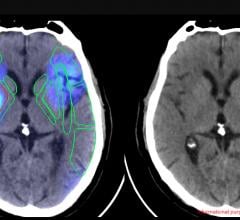A key milestone in the imaging of Alzheimer’s Disease has been reached by radiochemists from the University of Pittsburgh and GE Healthcare. The university is conducting a study aimed at obtaining preliminary information on the performance of flourine-18 labelled Pittsburgh Compound B (F-18 PiB) to identify amyloid deposits in subjects with a diagnosis of Alzheimer’s. Early results are encouraging, researchers said.
Although C-11 PiB can be used for academic studies, the 20-minute half-life of C-11 and limited manufacturing access means the molecule is not suitable for widespread use as a routine diagnostic agent. F-18, with a half-life of 110 minutes, offers a much better opportunity for manufacturing and distribution.
In 2003, GE Healthcare licensed a number of compounds from the University of Pittsburgh. Proof of concept studies have already been performed in collaboration with GE Healthcare’s IMANET organization, leading to the selection of the lead candidate for further research. Subsequent work has focused on producing the F-18 PiB material to the quality standards necessary for clinical trial use.


 June 06, 2023
June 06, 2023 








